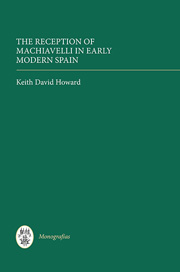Book contents
- Frontmatter
- Dedication
- Contents
- Acknowledgements
- Introduction
- 1 Medieval and Renaissance Humanist Political Discourse and Machiavelli
- 2 Machiavelli and Spanish Imperialist Discourse in the Sixteenth Century
- 3 Machiavelli and the Foundations of the Spanish Reason-of-State Tradition: Giovanni Botero and Pedro de Ribadeneyra
- 4 Machiavellian Discourse in the Hispanic Baroque Reason-of-State Tradition
- 5 Juan Pablo Mártir Rizo's Rereading of the Prince
- Conclusion
- Bibliography
- Index
1 - Medieval and Renaissance Humanist Political Discourse and Machiavelli
Published online by Cambridge University Press: 05 September 2014
- Frontmatter
- Dedication
- Contents
- Acknowledgements
- Introduction
- 1 Medieval and Renaissance Humanist Political Discourse and Machiavelli
- 2 Machiavelli and Spanish Imperialist Discourse in the Sixteenth Century
- 3 Machiavelli and the Foundations of the Spanish Reason-of-State Tradition: Giovanni Botero and Pedro de Ribadeneyra
- 4 Machiavellian Discourse in the Hispanic Baroque Reason-of-State Tradition
- 5 Juan Pablo Mártir Rizo's Rereading of the Prince
- Conclusion
- Bibliography
- Index
Summary
Machiavellians and Anti-Machiavellians, Past and Present
The European reception of Machiavelli is an extremely complex subject and much work remains to be done. Perhaps the most important obstacle to an accurate understanding of the reception of Machiavelli in Spain and elsewhere is that today there exists a daunting number of different scholarly readings of Machiavelli. This problem is compounded by our current, popular usage of the term “Machiavellian,” which I argue ultimately derives from the anti-Machiavellian mischaracterization of Machiavelli popularized during the Counter-Reformation Baroque. Perhaps surprisingly, it is possible to find traces of this mischaracterization of Machiavelli in twentieth- and twenty-first-century scholarship, most notably in the writings of Leo Strauss and, more recently, Sydney Anglo. In his otherwise deeply penetrating analysis of Machiavelli's works, Strauss himself recognizes that he agrees with what he calls the “noble,” “old-fashioned” and “simple” reading of Machiavelli as opposed to the “sophisticated” and “up-to-date” interpretation, arguing that Machiavelli was waging a war that “can be described, with the somewhat free use of Christian terms, as a war of the Anti-Christ or of the Devil who recruits his army while fighting or through fighting against the army led by God or Christ.” For Strauss, “Machiavelli's teaching is immoral and irreligious,” and he disagrees with those who say otherwise simply because Machiavelli points out the usefulness of religion: these “pupils of Machiavelli” ignore “his complete indifference to the truth of religion.”
- Type
- Chapter
- Information
- The Reception of Machiavelli in Early Modern Spain , pp. 13 - 40Publisher: Boydell & BrewerPrint publication year: 2014



